Exclusive Interview with the Makers of the Revelations Stage Play
Director Rhys McClelland
Writer James Michael Hughes
Here at the Clive Barker Podcast we’re proud to present an exclusive interview with director Rhys McClelland and writer James Michael Hughes of the Revelations Stage Play which recently had its one night workshop presentation last week at the Blank Theater in Hollywood. Which according to them went very well. Both men are obviously very passionate when it comes to the world of theater and bringing the story of Revelations to the stage the way Clive Barker would be proud of. They get what makes the story work and we can’t wait to see how the final production turns out.
Clive Barker Podcast: Tell us a bit about yourselves and what led you to be involved in the Theater?
RHYS: I started when I was about 10 years old. The theater that I grew up near to in my home town of Peterborough in England began a Youth Company and I joined as a hobby. It didn’t take long before I realized it was what I wanted to do for a career. I went through the usual training as an actor but quickly decided that I wanted to direct. I used to hang around the theater I grew up in watching people work and asking questions of the directors that I was meeting…then it developed from there.
JAMES: My first love was film. But in my early adult life, the acting bug bit. I studied at The Lee Strasberg Theatre Institute, observed at the Actors Studio, and studied privately with the late Oscar-winning actress Shelley Winters. I was also inspired by the teachings of Stella Adler – her work left me in awe. I was extremely fortunate to live close to Broadway and I devoured everything about the theatre. I was insatiable. But performing did not quench my thirst, I wanted to do it all. In producing, I found my calling – it excites me more than any other aspect of entertainment.
Clive Barker Podcast: Congratulations for being accepted into the Blank Theatre’s popular Living Room Series. How did that come about?
JAMES: Thank you. The Blank Theatre in Hollywood has a dynamic board member, Barbara Ligeti. She’s a prolific, seasoned theatre producer of sharp insight – and a ton of credits under her belt. Barbara has an innate gift for placing where projects they belong. I also happened to know the Living Room Series Chairman Bjorn Johnson, a genuine, vibrant (and wickedly funny) man of the theatre. He thought Clive Barker’s story would be an ideal fit for the Living Room Series. Both Barbara and Bjorn encouraged me to submit “Revelations” and I did. And they were right – we were accepted. I can’t tell you how your spirit soars when you’re accepted into a program like the Living Room Series. Acceptance means opportunity. Opportunity means progress – and it’s what the play needed and got.
Clive Barker Podcast: Explain to us how the workshop process works and how it will benefit the official production of the play?
RHYS: It’s important to remember that until now the whole process with the script has been silent reading and a writer with a laptop. With any new script there are countless things that you cannot tell will work onstage until you try them…but you really don’t want to try them on opening night in front of a paying audience and critics! That is where the workshop comes in. It is an opportunity to be in a rehearsal room with actors exploring the characters, the story or even individual lines, to hear the play as opposed to reading it which, to see the shape of the play without having to imagine it.
With the theater being a visual and audible medium as opposed to the novel which is an internal and analytical medium we have to take a moment between these two points to bring the story from the page of the novel and the imagination of a reader into the physical world. The process of adaptation for this piece began over 2 years ago, and this is the first time that an actor has taken the words of John Gyer for example and explored how it is said and how the space is used at the same time. We learn from this how much perhaps doesn’t need to be said and can be in a look or a gesture. We learn how to take the internal thoughts of a character as described so beautifully in the short story and have it translated into something visual, immediate and visceral before a live audience.
It’s an enormous transition! So much is learned about how the play moves on the stage, what the physicality of the characters is, how they use the space and how they convey any subtext physically and vocally. The workshop gives us the chance to explore all of those things without the pressure of an ‘opening night’ to really test the script and see what type of shape it is in off of the page.
Clive Barker Podcast: How did you both get involved with the project for bringing Revelations to the stage?
RHYS: When I was a member of that youth company many, many years ago one of my acting instructors was a great friend of mine, Simon Bamford who played ‘Butterball’ in Hellraiser and ‘Ohnaka’ in Nightbreed, so as he became a family friend over the years I learned a lot about Clive’s Barker’s work and heard lots of behind the scenes stories of the making of Hellraiser…in fact when I was a teenager and we went to Simon’s for dinner every now and then I was enthralled by the original pieces of artwork by Clive hanging on his wall and the puzzle box on the shelf near the fireplace!
Fast forward to April last year and I got word that someone was working on an adaptation of one of Clive’s stories and immediately wanted to be involved in some way, so I contacted Simon and asked him if he could find out who was doing it and how I got in touch! Which he did…he contacted Clive’s people and then forwarded me all of the information, I wrote to James about how much I wanted to be on board and we went from there. After reading the original story and then the stage adaptation we had some very long conversations about the project and where we saw it going…
Clive Barker Podcast: Does the play stay very close to the source material? Were there any changes that had to be made?
JAMES: Yes. My objective was to capture the essence of Clive Barker’s story. It was of paramount importance that he approve of the adaptation. Hence, that is precisely why I wanted Clive’s developmental contribution to the play. I wanted him to be a part of the process. Sure, I was doing the heavy lifting in terms of writing, but Clive and his team most definitely were privy to the various drafts before presenting “Revelations” as a workshop.
Adaptations are tricky, often difficult because you’re always thinking of the original author of the same story – it’s birth parent. “Revelations” stays true to the characters, location and narrative events – little in those areas changed. My task was to take the internal conflicts, psychological realms and personal issues of these six characters and dramatize them. That requires a deepening of characterization. Altering dialogue. Change of intent. Compressing time.
Clive Barker Podcast: How much has Clive Barker been involved? Has he been happy with the direction you both have taken the story in for the stage?
JAMES: Clive Barker is very much aware of the stage adaption of “Revelations.” In fact, he’s terribly excited about this incarnation of his story. Clive is a theatre lover. So here’s lies an opportunity for his creation to have life in another medium. Clive Barker had to be involved. He has read my drafts and provided insightful, practical notes. All of which has been tremendously useful. Clive’s imprint is on the adaptation, however the beauty of this incredible artist is he allows me to try, test and try again. I feel blessed that Clive Barker said yes and handed me this opportunity. Not a day goes by, that I am not grateful.
Now that we have accomplished the workshop presentation of “Revelations” we realize there is much more work to be done. It has a bed-rock foundation, strong and sturdy, but we need to adjust the architectural plans. There is enormous potential in this play and I’m eager to make it better. Nothing excites me more than cracking a problem.
Clive Barker Podcast: How did you approach the casting? Did you go for people that you felt looked like the character from the story? Or actors that captured the essence of what the characters were? Or maybe both?
JAMES: The Living Room Series has a race against time quality to it. You have a team and a determination to win the game. There is a looming deadline – meaning curtain time and you must be up and ready. There is no extension. You’re forced to think on your feet, adjust as needed, operate efficiently, be decisive, stay focused. Since you only have 7 days to executive a workshop, certain processes are cut short.
We had to tackle the casting process by enlisting actors we know or viewing their demo reels. Ideally, we would have embraced the opportunity to have our actors read for the part. I cannot emphasize enough how critical it is to see your actors read. Some actors were cast based on their stage work. I was fortunate to have seen half of our cast in fully realized performances – which is one of the best ways to cast. Some looked the part. Some had a definite lock on interpretation, some had the emotional capacity – there were varied reasons for choosing our cast. Ultimately, we needed our cast to deliver Clive Barker’s story. And they did.
The Clive Barker Podcast: We’re curious to know how you’re going to do pull off some of the special effects that are in the story. Especially the parts with Buck’s spirit trying to seduce Virginia? Has any of this been a challenge to overcome in the writing and directing of it?
RHYS: At this stage for the workshop process we are mostly interested in the development of the story through the text, so the visual magic will come a little later. In a workshop we ask the audience to use a bit of imagination in some of those more ‘supernatural’ or physical moments and evaluate the scripts structure and characterization.
However, this process is an opportunity for me and James to explore some of those moments and come up with ideas on how we will tackle these moments in the full production at a later date.
I won’t go into to much detail and spoil anything, but we have been looking a lot at the mechanics of misdirection and illusion, the neuroscience of perception, visual and audible trickery…all i’ll say is that street magicians have been fooling the human brain into believing all kinds of things for thousands of years with very simple exploitation of the gaps in perception…watch this space.When you come and see the full production you’re eyes may trick you a bit…but of course we will never tell you how it was done.
The Clive Barker Podcast: If this is successful would either of you like to adapt more of Clive Barker’s work for the stage?
JAMES: Without hesitation.
The Clive Barker Podcast: Last question, tell the podcast what your favorite Clive Barker story is and why?
RHYS: One of my favorite things about Clive’s work is his ability to create multiple worlds that inhabit a single space, then create frictions between those worlds. He places us right in that friction that is created. His stories create a feeling that if you turned around fast enough you could catch a whole other world going on behind you or out of the corner of your eye! This is one of the things that I liked so much about Revelations
Because of this one of my favorite stories is Imajica…it fires my mind to think that there are worlds at the extreme reach of our imagination that are a single thought away, hiding behind a thin veil of perception. Clive creates those worlds so beautifully then places them so close to ours you can almost feel them behind you as you read.
We here at the Podcast would like to thank these fine gentlemen for taking the time out and answering our questions. Keep up the good work guys. Also, we’d like to give a special thank you to James Michael Hughes for setting this up.


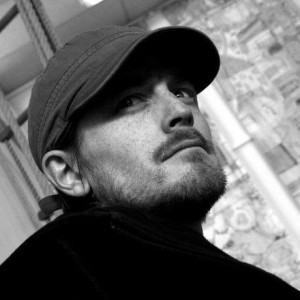
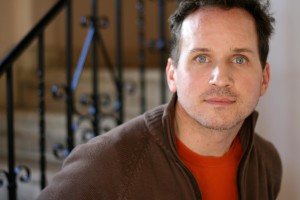


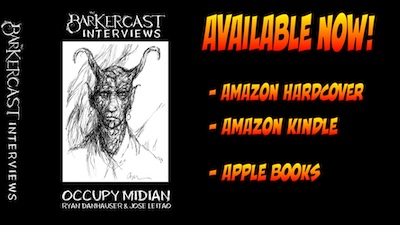
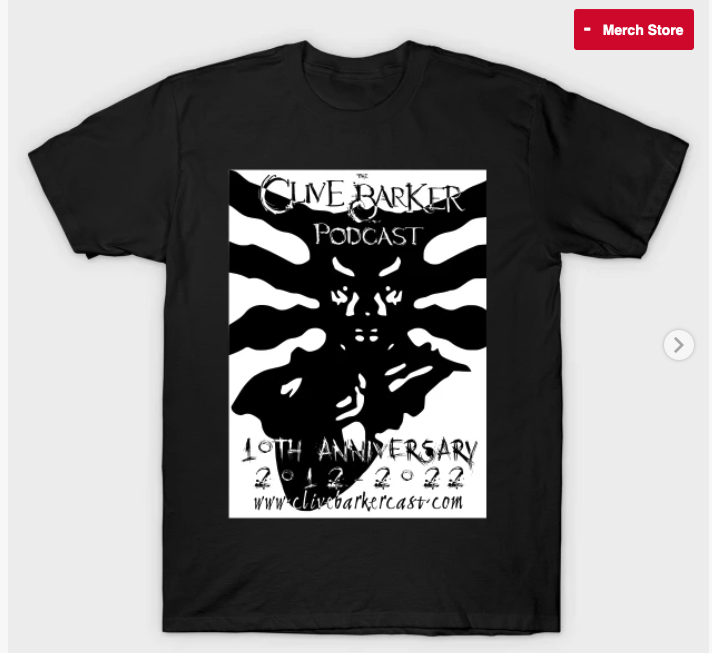

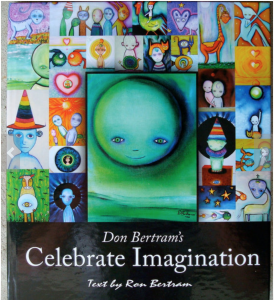




















[…] Rob Ridenour’s Interview with the People of the Revelations Stage Play […]
[…] check out the the Podcast own interview we did with the makers of the Stage […]